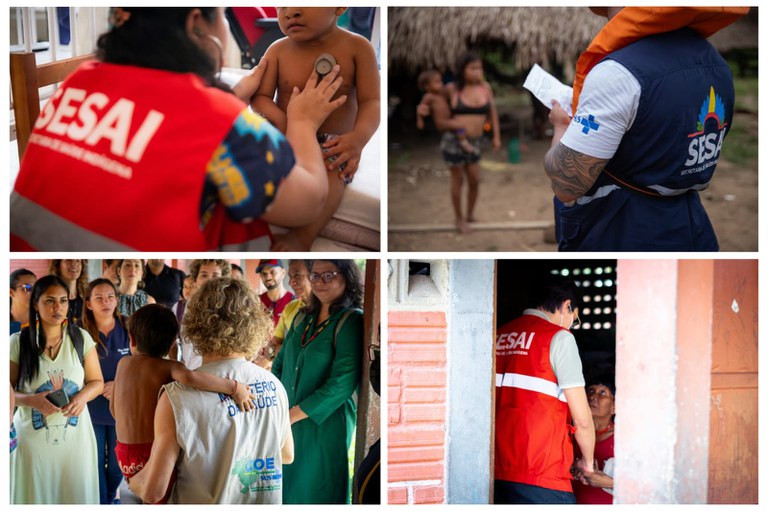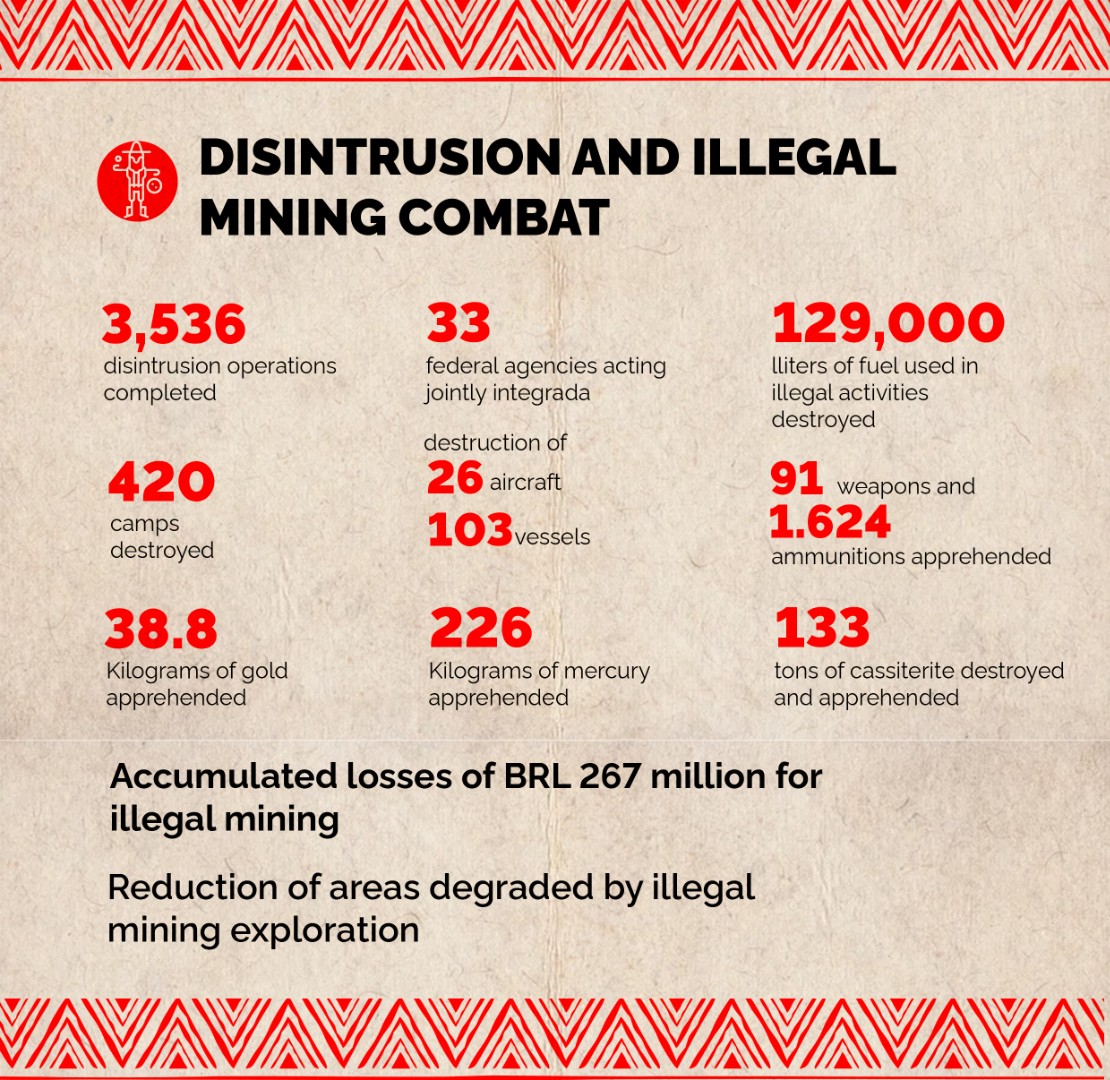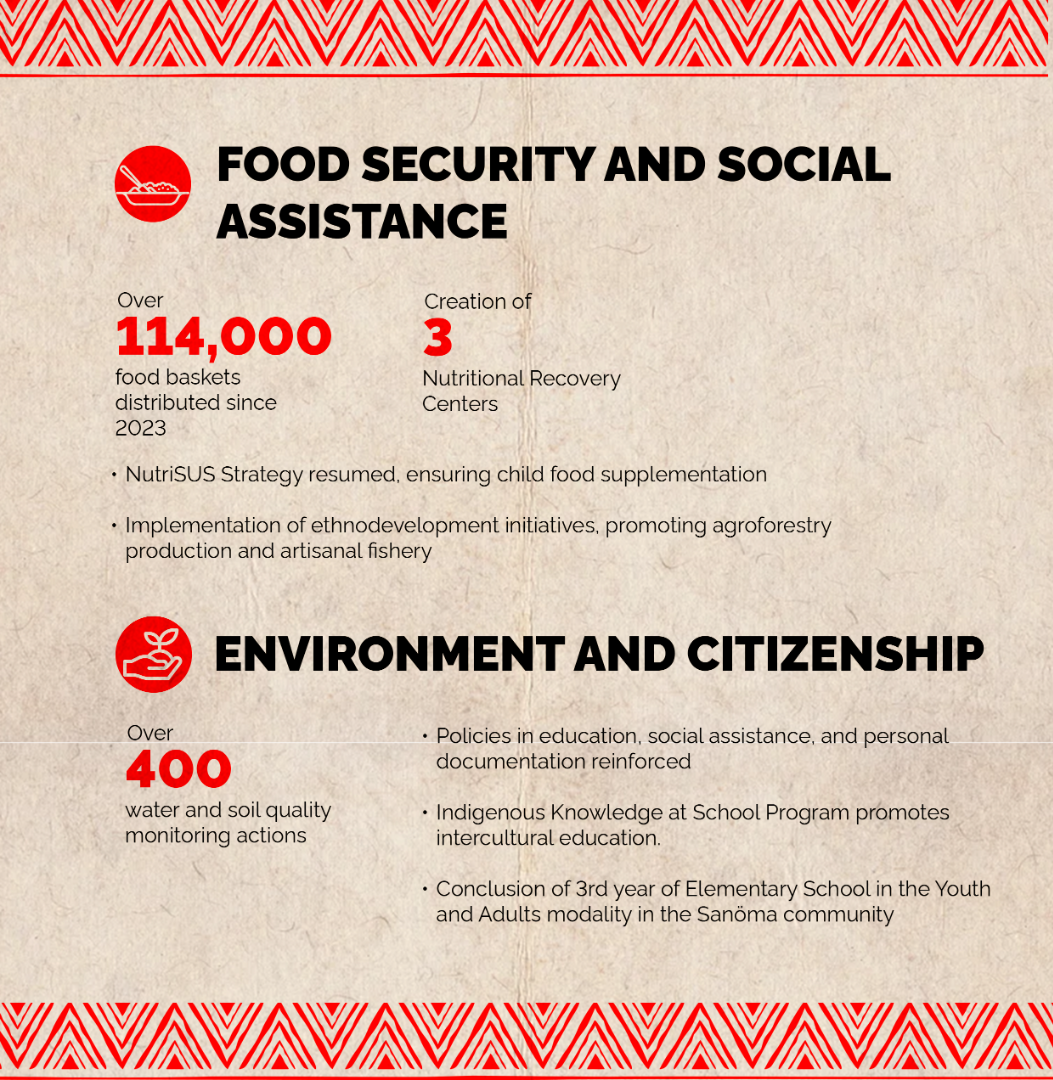Notícias
YANOMAMI
Two years of federal actions at Yanomami Land: illegal mining dropped drastically, deaths from malnutrition reduced by 68%

Monitoring, dismantling illegal mines, commitment to environmental recovery, health care and food security: integrated action by the federal government - Credit: Composição sobre fotos do MS
The drastic reduction in illegal mining, the expansion of health services, environmental recovery, and the guarantee of food security are victories that reflect the joint effort of various institutions to ensure a dignified and sustainable future for these communities” —
Sônia Guajajara, Brazil’s Minister of Indigenous Peoples
FEDERAL GOVERNMENT’S INTEGRATED ACTION:
❖ 3,536 security operations in 2024
❖ More than 114,000 food baskets distributed over two years
❖ 68% reduction of deaths from malnutrition in the first semester of 2024, compared to 2023
❖ 91% reduction of consolidated illegal mining sites
❖ 95.76% reduction of new illegal sites
❖ 100% of health base hubs in operation
❖ 155% increase in health professionals in the territory
Declared on January 20, 2023, at the beginning of President Luiz Inácio Lula da Silva’s administration, the public health emergency generated by the serious lack of assistance faced by the Yanomami people marked the start of a series of federal actions in the Yanomami Indigenous Land (Terra Indígena Yanomami /TIY), Brazil’s largest Indigenous reservation, which is home to around 27,000 people.
This Monday, January 20, marks two years since the launch of integrated initiatives that have led to significant progress in combating illegal mining, protecting the environment, reducing deaths from malnutrition, and improving the quality of life in Indigenous communities.
33 AGENCIES — The federal response involves the cooperation of 33 agencies coordinated by the Office of the Chief of Staff. The State has achieved a constant presence in the territory, Lula visited the region, reinforcing the Federal Government’s determination to improve health conditions and protect the Yanomami, in addition to prioritizing measures to combat the causes of the humanitarian crisis.
BRL 1.7 BILLION — The gravity of the situation caused the Federal Government to release BRL 1.7 billion in extraordinary credits. Implementing the Government House (Casa de Governo) in Boa Vista strengthened the work in place. The structure provided by the Federal Government was inaugurated in February 2024, when it became the center of the operations to remove the invaders from the Yanomami Land, consolidating the first permanent policy in the region.
COMBATING ILLEGAL MINING — A total of 3,536 security operations conducted in 2024 alone imposed the illegal mining criminal network a loss of BRL 267 million and consolidated a drop of 95.76% in the installation of new illegal mining sites, which reduced from 1,002 hectares explored in 2022 to 42 hectares in 2024. The combat measures resulted in a 91% reduction of areas already impacted by illegal mining in the Yanomami Indigenous Land. Data from the Management and Operation Center of the Amazon Protection System (Centro Gestor e Operacional do Sistema de Proteção da Amazônia/ CENSIPAM) show that active illegal mining has dropped from 4,570 hectares in March to 313.6 hectares in December.
ENVIRONMENTAL QUALITY — The achievements have generated direct impacts on environmental quality, including a significant reduction in the turbidity level of local rivers, which have begun to resume their natural color. Brazil’s Ministry of Science and Technology (Ministério da Ciência e Tecnologia), in partnership with the Foundation for Space Science, Technology and Applications (Fundação de Ciência Aplicações e Tecnologia Espaciais/ FUNCATE), is spearheading a BRL 6.4 million initiative to monitor the presence of mercury in the rivers and fishes, as well as the communities’ level of exposition to the substance, which is widely used in illegal mining.
HEALTH AS POLICY — In parallel, health services have now begun to be ensured as a public policy, with systematic notifications, planning, and consultations. Since 2023 a total of seven health hubs that had been de-activated were reopened, ensuring service provision for 5,200 Indigenous persons. The number of deaths from malnutrition dropped by 68% between the first semesters of 2023 and 2024. The immunization and malaria combat programs also recorded significant advancements.
PROTECTING RIGHTS AND LIVES — According to the Minister of Indigenous Peoples, Sônia Guajajara, the Federal Government has been advancing in the protection of the rights and the lives of the Yanomami population. “The drastic reduction in illegal mining, the expansion of health services, environmental recovery, and the guarantee of food security are victories that reflect the joint effort of various institutions to ensure a dignified and sustainable future for these communities.”
ACTION PLAN — The Federal Government has structured an integrated action plan in the Yanomami Indigenous Land, launched on February 2024, to ensure the continuity of the actions initiated in 2023 and strengthen the State’s presence in the territory. The goal was to consolidate disintrusion efforts (removal of illegal miners), address the humanitarian crisis, and promote the resumption of the autonomy and way of life in the territory.
FIVE PILLARS — The integrated plan is divided into five pillars:
The installation of the Government House marked a new stage in the work of federal agencies. Our strategy was divided into two fronts: acting inside the territory to combat illegal mining structures, and a siege outside the Indigenous Land to impact the logistic support provided to these activities inside the territory"
Nilton Tubino, Director of the Government House in Boa Vista, in the state of Roraima
1) Disintrusion, measures to combat criminal organizations, protect the territory, and repress illicit environmental activities
2) Health care and monitoring
3) Food security and sovereignty
4) Environmental surveillance and recovery
5) Access to citizenship and social development actions.
Each pillar foresees a series of strategic actions (117 actions in total).
CHECK OUT THE DETAILED PLAN
PILLAR 1: Disintrusion and illegal mining combat
The federal work is now coordinated and unified, as explained by the Director of the Government House in Boa Vista, Nilton Tubino. “The installation of the Government House marked a new stage in the work of federal agencies. Our strategy was divided into two fronts: acting inside the territory to combat illegal mining structures, and a siege outside the Indigenous Land to impact the logistic support provided to these activities inside the territory, such as landing strips, aircraft, fuel, all the equipment and infrastructure used for illegal activities,” highlighted Tubino.
The director explained how the operations outside the territory were executed: “We worked with the participation of security forces, but also with agencies — ANP [Oil], ANAC [Civil Aviation], ANTT [Terrestrial Transportation] — to reinforce the work of the National Force, the Federal Highway Police, and the Federal Police in these surveillance efforts and actions outside the Indigenous Land, which generated good results.”
The presence of the Army and security forces will be strengthened with the launch of the Special Border Deployment (Destacamento Especial de Fronteira/DEF) in the Waikas region. The unit has been completed and will soon be inaugurated. Renovations are also underway at the Special Border Squad (Pelotão Especial de Fronteira/PEF) in Surucucu. Once completed, various Federal Government agencies will be able to operate from Sucururu, with staff stationed on-site.

- Disintrusion and illegal mining combat
PILLAR 2: Health care and monitoring
Reinforcing the infrastructure and the number of professionals has been key to the State’s ability to tend to the emergency and structural needs of the Indigenous population.
100% OF BASE HUBS — Seven Health Base Hubs within the Yanomami Special Indigenous Sanitary District (Distrito Sanitário Especial Indígena/DSEI) have been reopened. At the beginning of 2023, services were severely disrupted due to illegal mining and the destruction of health infrastructure in the region. With the reopening of these hubs, health teams have resumed operations in Kayanaú, Homoxi, Hakoma, Ajaraní, Haxiú, Xitei, and Palimiú, providing continuous care and monitoring to previously neglected communities. Currently, all 37 existing Base Hubs are fully operational.
NEW UNITS — A total of six new Basic Indigenous Health Units (Unidades Básicas de Saúde Indígena/UBSI) have been constructed, bringing the total number of UBSIs in the territory to 40. This adds to a combined total of 77 health centers currently in operation.
SPECIALIZED — In one of the most populous regions of the Yanomami Indigenous Land, the Federal Government is promoting a partnership with the Central Única das Favelas (CUFA) and German organization Target Reudiger Nehberg to provide medium complexity medical care to the territory in an unprecedented initiative. The Reference Center in Surucucu, currently under construction, will benefit 10,000 Indigenous persons across 60 communities. The construction work is expected to be concluded in August this year.
NEW HOSPITAL — The completion of the Hospital Back-Up Unit for Indigenous Peoples (Unidade de Retaguarda Hospitalar aos Povos Indígenas) in Boa Vista is expected in the first half of this year, with 75 beds designated exclusively for Indigenous individuals. Additionally, the Indigenous Health Support House (Casa de Apoio à Saúde Indígena/CASAI) in Boa Vista is undergoing restructuring to enhance the reception and care for Indigenous patients receiving treatment at the facility.
RENOVATION — The renovated food center and nursery already provide an improved environment. Over 2,000 meals are served every day in the new food center. The renovation work received BRL 2 million in investments. Other improvements are being implemented, such as additional accommodations and bathrooms, the installation of water supply reservoirs, solid waste shelters, and guardhouses, among other upgrades, with a total investment of BRL 44.8 million.
MORE PROFESSIONALS – The villages now count with 1,759 professionals, a 155% increase compared to the number available in early 2023 (previously 690). Among them are doctors, nurses, dentists, and nutritionists.
SUPPLY – A total of 29 water supply systems have been implemented in the territory, with another 43 reactivated or restored. An additional 18 are currently under construction or having their elevated reservoir systems renovated. With these structural advancements, the monitoring process has been expanded. The most recent data refers to the first half of 2024:
● Reduction in deaths: The first semester of 2024 saw a 27% drop in the number of deaths compared to the same period in 2023, going from 213 to 155. An expressive drop was recorded in the number of deaths from malnutrition (-68%), respiratory infections (-53%), and malaria (-35%).
● Malnutrition: Since the expansion of nutritional monitoring for children under 5 years of age, with intensified active case finding and expanded access to services, the number of children classified as having a nutritional deficit has increased from 49.2% to 51%. The increased ability to provide qualified diagnoses and timely treatment to prevent malnutrition has already yielded positive results, including a 68% reduction in malnutrition-related deaths.
● Malaria: The expansion of access to timely diagnoses and treatment led to a 73% increase in malaria tests during the first half of 2024 compared to the same period in the previous year. This has also resulted in a rise in the number of reported cases, from 14,450 in the first half of 2023 to 18,310 in the first six months of 2024. However, with expanded assistance, the fatality rate dropped by 35%.
● Vaccination: There was a 58% increase in the number of doses applied in the first semester of 2024 compared to the same period of the previous year.
OFFICE – Another highlight is the partnership between the Ministry of Health’s Indigenous Health Secretariat (Secretaria de Saúde Indígena/SESAI) and the Brazilian Support Agency to the Management of the Unified Health System (Agência Brasileira de Apoio à Gestão do SUS/AgSUS), which resulted in the inauguration of a regional office in Boa Vista in September 2024. The office was established to strengthen the implementation of health policies in the Yanomami territory and other areas that tend to Indigenous peoples’ health. The structure aims to provide operational and strategic support to the actions implemented by SESAI, focusing on:
● Recruitment, selection, and training of health professionals to work in difficult-to-reach and underserved regions;
● Support the implementation of assistance and management technologies to qualify services provided to the Indigenous population;
● Monitoring and evaluation of health actions undertaken in the Yanomami territory through the collection of data regarding service provision and the work of hired professionals.

- Data on food security, social assistance, and the environment
PILLAR 3: Food Security and Social Assistance
Food security has been strengthened with the distribution of over 114,000 food baskets since 2023. Moreover, three Nutritional Recovery Centers were created and the NutriSUS strategy was resumed, ensuring child food supplementation. Ethnodevelopment projects were also implemented, fostering agroforestry production and the resumption of traditional farmsteads and artisanal fishery.
Through a joint effort by the Ministry of Social Development and Assistance, Family, and Hunger Eradication (Ministério do Desenvolvimento e Assistência Social, Família e Combate à Fome), FUNAI, and the Ministry of Defense (Ministério da Defesa), over 3,000 kits with agricultural and fishing tools were delivered to the communities, as well as 184 pieces of equipment for cassava flour mills (casas de farinha). New farmsteads were formed to produce foods so that the Yanomami could recover their productive capacity.
PILLAR 4: Environmental Surveillance and Recovery
Water and soil quality monitoring has been intensified through over 400 actions implemented by 2024. There are indications of natural regeneration in previously degraded areas, and measures to manage residues and provide access to potable water have impacted the quality of life. The Action Plan to prevent the impacts of mercury exposure is underway. Also with the goal of protecting and recovering the environment, the “Environmental Surveillance Network of the Yanomami Indigenous Territory” (Rede de Monitoramento Ambiental do Território Indígena Yanomami) project is another action currently underway. Coordinated by IBAMA and executed in partnership with the Ministry of the Environment and Climate Change (Ministério do Meio Ambiente e Mudança do Clima/MMA) and other federal institutions, the project has been collecting samples since November 2023, including drinking water, water from water bodies, sediment, and fish, to identify the presence of chemicals of concern, particularly those related to mining activities in the Yanomami Territory and adjacent Conservation Units. This action will continue until 2027.
PILLAR 5: Access to Citizenship and Social Development
Policies in the areas of education, social assistance, and personal documentation have been reinforced to ensure the rights of the Yanomami peoples. Projects such as the Indigenous Knowledge at School Program (Programa Saberes Indígenas na Escola) promote differentiated education through the implementation of the Yanomami and Yek’wana Ethnoeducational Territory.
In the educational area, the year 2024 was marked by the planning of actions to build 10 knowledge spaces, four Yanomami and Ye´kwana School Homes (Casas de Escola), as well as a training center, starting in 2025 with investments of BRL 16 million.
In 2024, the highlight was the completion of the 3rd year of Elementary Education in the Youth and Adult Education (Educação de Jovens e Adultos/EJA) modality in the Sanöma community, taught by the College of Applied Sciences and the Insikiran Institute (Colégio de Aplicação e Instituto Insikiran) at the Federal University of Roraima (Universidade Federal de Roraima), in partnership with the Ministry of Agrarian Development (Ministério do Desenvolvimento Agrário) and FUNAI. The educational content is linked to rural technical assistance, and environmental and territorial management for 70 students from 36 communities. The expectation for 2025 is the completion of elementary education.
“Strengthening the presence of the State is proof that we are building a new path for the autonomy and dignity of the peoples in the region, in harmony with their ways of life and the preservation of their territory. All done through permanent dialog, consultation, and joint construction with the Indigenous peoples,” concluded Minister Sônia Guajajara.